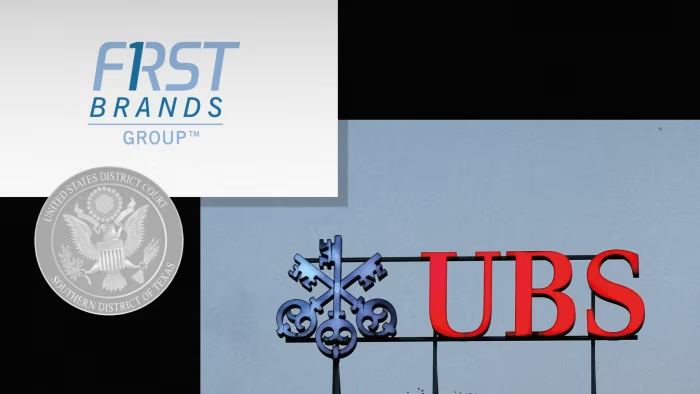A UBS fund has 30 per cent of its portfolio tied to the failed First Brands Group, leaving Switzerland’s largest bank grappling with a bankruptcy that has convulsed global finance.
Clients are braced for big losses after UBS O’Connor, a private credit and commodities specialist owned by the Swiss bank, revealed that 30 per cent of the exposure in one its funds is tied to the auto parts group.
O’Connor recently told investors in its “Opportunistic” working capital finance strategy that the fund has 9.1 per cent of “direct” exposure — financing facilities based on invoices First Brands’ was due to pay — and 21.4 per cent of “indirect” exposure — based on invoices its customers were due to pay.
Overall, UBS has more than $500mn of exposure to First Brands’ debt and invoice-linked financing, across various parts of its investment arm, according to bankruptcy filings.
UBS is just one of many investors to be hurt by the implosion of the Ohio-based industrial business, which has raised broader questions about the dangers lurking in the booming private credit market.
Some of the biggest names on Wall Street such as Blackstone had exposure to First Brands debt, while less known financing firms, such as Utah-based leasing specialist Onset Financial, are also deeply embroiled in the fiasco.
For UBS, the fallout over First Brands threatens to engulf the highest echelons of Swiss banking in a fresh crisis relating to invoice finance, nearly five years after the implosion of Greensill Capital rocked Credit Suisse.
UBS later rescued Credit Suisse from the brink of failure in 2023 and is still dealing with a raft of legacy litigation relating to the Greensill scandal.
O’Connor’s funds invested in invoice-backed debt linked to the auto parts company through a technology platform called Raistone, whose business was heavily dependent on arranging financing for First Brands.
Founded in 2019 by former Greensill Capital employee David Skirzenski, New York-based Raistone’s website states that it provides billions of dollars in “working capital” financing a year to companies “of all sizes”. However, the fintech business was deeply entwined with First Brands and is now experiencing difficulties of its own.
One of O’Connor’s funds also held an equity stake in Raistone itself, according to four people familiar with the matter.
O’Connor is in the process of being sold by UBS to Cantor Fitzgerald, the Wall Street brokerage whose longtime leader, Howard Lutnick, stepped down as chair and chief executive in February to become Donald Trump’s commerce secretary.
The level of exposure in the O’Connor fund could spark concern among investors who were previously assured that it would not hold more than 20 per cent of assets in a single “position”.
O’Connor split out the 21.4 per cent of “indirect” exposure across First Brands’ various customers, which were often investment-grade rated. This meant that the exposure did not exceed a 20 per cent “max position limit” in the O’Connor fund, which was previously disclosed to investors in documents seen by the Financial Times.
“The Working Capital Fund is not in breach of any applicable investment restrictions or guidelines,” said UBS.
UBS said the investment in Raistone is “held by a fund managed by O’Connor”, adding that the bank itself “does not have a proprietary equity stake”.
One person familiar with the matter said this stake represented less than 1 per cent of the O’Connor fund’s assets and was also disclosed to investors in its working capital funds. They added the O’Connor fund’s stake represented a “small” minority of Raistone’s shares.
First Brands accounted for between 70 and 80 per cent of Raistone’s revenues, according to people familiar with the matter. The firm recently laid off 60 people as a result of the situation, the people said, keeping 40 in total. Bloomberg previously reported that Raistone had cut jobs and relied on First Brands for most of its revenue. Raistone declined to comment.
As well as acting as a platform, Raistone also invested in First Brands’ invoices through several different structures, including special-purpose vehicles. One person familiar with the matter said these vehicles were also managed on behalf of third party investors, however.
Investors with exposure of $631mn to First Brands’ supply-chain finance programme — which rely on First Brands’ settling invoices — are listed in connection with Raistone in the company’s bankruptcy filing.
However, Raistone is also listed as having an “undetermined” amount of exposure to First Brands’ “receivables” — which are tied to invoices settled by customers — due to the “contingent”, “unliquidated” or “disputed” nature of its unsecured claim.
This uncertainty could pose problems for O’Connor and other investors that invested through Raistone.
The brewing disputes over this collateral, coupled with an investigation as part of the bankruptcy into whether invoices were pledged “more than once”, could mean that investors have to fight to prove that this financing is backed with a claim against First Brands’ customers rather than the company itself.
Raistone last week lodged an objection to a rescue loan for the company, arguing the receivables it bought are its own property, not that of the company’s estate. Raistone added there was “considerable risk” that these assets “could easily be swept up as cash collateral or pledged to secure” the rescue facility.
In January 2023, O’Connor provided investors in its funds with a case study on a “North American auto parts manufacturer” that appears to refer to First Brands, as revenue and margin numbers disclosed match those in the company’s 2022 accounts. The case study disclosed that O’Connor was earning a 17 per cent yield on 60-day investments linked to the company’s supply-chain.
The case study disclosed that “risks include default and fraud”.
Additional report by Ortenca Aliaj
